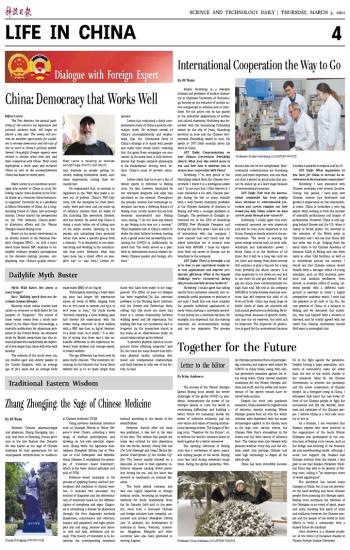
 |
| Professor Krister Holmberg. (COURTESY PHOTO) |
Krister Holmberg is a Swedish chemist and professor of surface chemistry at Chalmers University of Technology, focuses on the behavior of surface active compounds in solution and at interfaces. For the active role he has played in the industrial applications of surface and colloid chemistry, Holmberg was bestowed with the Quancheng Friendship Award by the city of Jinan, Shandong province in 2019 and the Chinese Government Friendship Award in 2021. He spoke to S&T Daily recently about his work in China.
S&T Daily: Congratulations on your Chinese Government Friendship Award. What does this award mean to you and how does it motivate you to deepen your cooperation with China?
Holmberg: I’m very proud of the Friendship Award from the Chinese Government. I know it is a prestigious award and I’m not sure that I fully deserve it. I have interacted a lot with Chinese people during the last 10 years, initially with a well-known chemistry professor at the Chinese Academy of Sciences in Beijing and with a younger professor in Chengdu. The professor in Chengdu introduced me to the CEO of Shandong GiNZRE New Materials Company and during the last five years I have had a lot of interactions with that company. I have enjoyed that very much and the award stimulates me to interact even more with GiNZRE. I hope my experience from my career in Europe can be beneficial to the company.
S&T Daily: There is normally a lot to be done to put experiment results into real applications and improve production efficiency. What is the biggest challenge you've encountered during this process and how do you resolve it?
Holmberg: I totally agree that taking results from university research into industrially useful processes or products is not easy. I think that one must consider the possible industrial applications already when starting a university project. If one carries out a chemical reaction, for example, it is important that the starting materials are environmentally benign and not too expensive. The process should also not be too complicated. Environmental considerations are becoming more and more important, and one must not start a project in small scale that cannot be scaled up at a later stage because of environmental concerns.
S&T Daily: Now that the international community has been paying more attention to environmental protection and carbon emission cut, how would you help China achieve its dual carbon goals through your research?
Holmberg: I totally agree that environmental concerns are very important and will be even more important in the future. Energy is closely related to the environment. The world is heading for green energy sources such as solar cells, windmills and hydroelectric power. I know China is in the forefront of all three. But it will be a long way until we are there and energy from fossil sources will continue to play a big role for a long time, probably the whole century. It is then important to cut down on coal and to use more oil and gas instead. Oil and gas are much more environmentally benign than coal. My role at the company GiNZRE is to help develop chemical solutions that will improve the yield of oil from oil fields. China has many large oil fields. Some of these are relatively old and annual production is declining. By injecting small amounts of specific chemicals into the oil reservoir, the yield can be improved. The improved oil production is good for the environment because it makes it possible to replace coal by oil.
S&T Daily: What suggestions do you have for China to increase its involvement in international cooperation?
Holmberg: I have interacted with Chinese scientists over several decades. During this period, I have seen how Chinese science has developed and grown in importance on the international scene. China is nowadays a very big player when looking at both the number of scientific publications and impact of publications. However, China is still lagging behind Europe and the U.S. when it comes to Nobel prizes. I'm involved in the selection of the Nobel prize in Chemistry and I can see that China still has some way to go. Judging from my many visits to the Chinese Academy of Sciences (CAS) in Beijing and also from visits to other CAS facilities, as well as to universities around the country, I would say that Chinese science would benefit from a stronger influx of young scientists, such as PhD students, postdocs and assistant professors, from abroad. A constant influx of young, talented people with a different background is essential in today’s highly competitive academic world. I once had the pleasure to sit next to Liu He, the vice premier of China, at a banquet in Beijing and we discussed this matter. Liu, who had himself been a student at Harvard, said he totally agreed with my views that Chinese universities should find ways to accomplish this.







